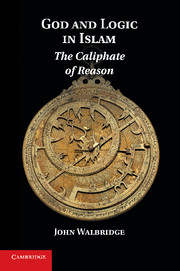Book contents
- Frontmatter
- Contents
- Illustrations
- Preface and Acknowledgements
- Spelling, Names, and Sources
- Introduction
- PART ONE THE FORMATION OF THE ISLAMIC TRADITION OF REASON
- PART TWO LOGIC, EDUCATION, AND DOUBT
- 6 Where Is Islamic Logic? The Triumph of Scholastic Rationalism in Islamic Education
- 7 The Long Afternoon of Islamic Logic
- 8 The Institutionalization of Disagreement
- PART THREE THE FALL AND THE FUTURE OF ISLAMIC RATIONALISM
- Selected Bibliography
- Index
6 - Where Is Islamic Logic? The Triumph of Scholastic Rationalism in Islamic Education
Published online by Cambridge University Press: 01 March 2011
- Frontmatter
- Contents
- Illustrations
- Preface and Acknowledgements
- Spelling, Names, and Sources
- Introduction
- PART ONE THE FORMATION OF THE ISLAMIC TRADITION OF REASON
- PART TWO LOGIC, EDUCATION, AND DOUBT
- 6 Where Is Islamic Logic? The Triumph of Scholastic Rationalism in Islamic Education
- 7 The Long Afternoon of Islamic Logic
- 8 The Institutionalization of Disagreement
- PART THREE THE FALL AND THE FUTURE OF ISLAMIC RATIONALISM
- Selected Bibliography
- Index
Summary
“WHERE IS ISLAMIC LOGIC?”
By this question, I ask what books contain the analyses made by learned, non-Westernized Muslims, usually writing in Arabic, that are comparable with what in the West is called “logic” – in particular, those that are comparable with what the medieval West called logic.
“Why, surely in books of logic,” we would likely say, by which we would mean the discipline learned by the Muslims from Aristotle and his commentators, a discipline known in Arabic as ‘ilm al-manṭiq, “the science of speech.”
But by even posing the question explicitly, we begin to have doubts. The translations of scientific and philosophical texts from Greek and Syriac into Arabic were mostly done in the ninth century, and it was not until the tenth century that indigenous Islamic logicians began to appear. The logic that they promulgated and that was carried on for century after century is generally held to have remained very close to its Greek models. Even a modern Islamic logician can observe, “To the subjects studied in logic, the modern [i.e., Islamic] logicians added semantics [lit., “the investigation and classification of terms”] and the hypothetical proposition and syllogism. They omitted the study of the ten categories and neglected almost completely the five arts [material logic].” Modern critics dismiss the later logic – by which they mean everything but the first three centuries – as sterile reworking of familiar material, “the age of the schoolmasters,” to use the derisive phrase of a modern historian.
- Type
- Chapter
- Information
- God and Logic in IslamThe Caliphate of Reason, pp. 107 - 120Publisher: Cambridge University PressPrint publication year: 2010

